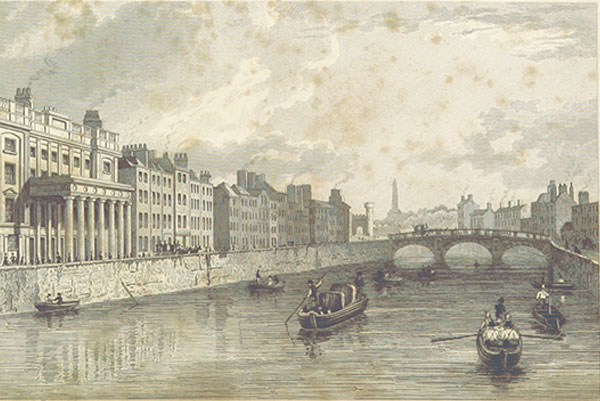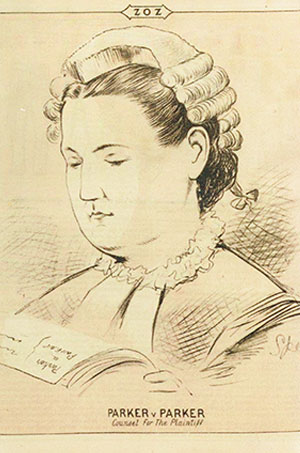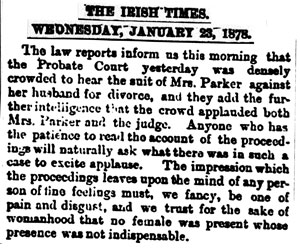Parker v. Parker
Published in 18th-19th Century Social Perspectives, Features, Issue 5 (September/October 2018), Volume 26A case of money and influence against the honour of an Irish lady?
By Joan Capstick
In 1878 a sensational divorce petition came before the Dublin probate and matrimonial court. Sarah Parker, née Ganly, a well-known and unconventional lecturer on women’s rights and spiritualism, sued her husband, Matthew Gibson Parker, a partner in Ganly, Son and Parker, for divorce on the grounds of cruelty. Previously her lecture ‘Are marriage bonds indissoluble?’ was much publicised and criticised. The court was packed with members of the bar interested in the case, as less than 300 divorces were then granted annually.
Opening the case, Sarah said that she was grateful for the support shown to her following her decision to represent herself in court. She represented all enslaved women at the mercy of brutal husbands. The editor of Saunders News-Letter had said that it would be more in the interests of society that she should be heard than that she should be sacrificed to preconceived ideas of a woman’s duty to Mrs Grundy (a figurative woman, personifying the tyranny of conventional propriety in society).
Sold into bondage by her father
Sarah claimed that she had been powerless against her father James’s iron will when he had sold her into bondage by agreeing to her marriage in 1851 in Longford to Matthew, in return for the latter’s paying off a mortgage of £300 that James owed. His business growing, James made Matthew a partner. Sarah described herself then as an ignorant and innocent girl, cut off from her family and friends living in Dublin. Matthew was insanely jealous and mean, even depriving her of sufficient clothing and food in their first year together. In addition he was a drunkard, with an aversion to washing. Her complaints about her husband were dismissed by her father. She ran away many times, and suffered several illnesses that her doctor attributed to her husband’s ‘unnatural habits’. She had moved into her own bedroom and refused to sleep with him. On her doctor’s advice, she threw herself into intellectual pursuits and decided to give up any hope of a normal marriage.

Above: A mid-nineteenth-century view of Ussher’s Quay and Queen’s Street bridge. The pillored building on the left was the premises of Ganly, Son and Parker, the business partnership of Sarah’s father and husband. (British Library)
In 1854 Matthew had agreed to her opening a millinery and dress shop. (His permission was needed, as a husband was legally responsible for his wife’s debts.) Sarah claimed that six years later, in a jealous rage, he had forced her to shut down the shop, as he believed that it was attracting ‘fast young men’, and accused her of immoral practices. Matthew gave evidence dismissing her claims, saying that to save both their reputations he had decided that it should close. He paid her £600 debts, and bought her a pony and trap in consideration of her agreement.

Above: Sarah Parker, ‘counsel for the plaintiff’, as depicted in the satirical ZOZ magazine. (British Library)
Sarah told the court that following the closure Matthew’s violence towards her, both physical and mental, increased. Incensed because men at a Christmas party had kissed her under the mistletoe, he tried to throw her from their carriage over a bridge. He hurled objects, including a chamber-pot, at her, beat her and accused her of immorality. Matthew counterclaimed that her disgraceful behaviour and violence towards him were the cause of their problems. In 1863, whilst he was away, she had sold the contents of the Longford house and taken a new one in Fitzwilliam Street, Dublin, without his knowledge or permission. Sarah denied this, stating that they had agreed to keep the move a secret from her father, who wanted Matthew in Longford for business reasons. As a married woman she could not have signed the lease without Matthew. Two servants gave evidence describing their tempestuous relationship during the four years they lived in Dublin, with Matthew frequently drunk and violent towards her. Sarah admitted fighting back in self-defence and arguing constantly with him, threatening court action. With Matthew frequently away on business, she had entertained her literary friends, furthered her interest in spiritualism and developed a growing interest in women’s rights.
Filed for divorce in 1867
In 1867 she had filed a divorce suit, citing her husband’s cruelty. Matthew defended that action and a separation deed was agreed instead on the grounds of unhappy differences. The divorce proceedings were suspended on condition that they lived apart, and Matthew paid an annuity of £156 during their joint life, in full discharge of any financial claims she would have against him. She was considered a ‘femme sole’, a single woman, in all things relating to her residence and right of property. Her brother Andrew, a party to the deed, had arranged for the alimony to be paid through Ganly, Son and Parker.
Sarah told the court that for the following nine years she had travelled throughout America and had needed to supplement her income by lecturing on spiritualism and women’s rights. Called to give evidence, her brother Andrew confirmed that in 1874, whilst she was living in Peru, Matthew had instructed her alimony to be stopped. Matthew counterclaimed that it was Post Office irregularities that had disrupted the money getting through.
Sarah said that in 1876 she had received a letter from her sister Mary, informing her that Matthew had told her that he wished for Sarah to return to Dublin and for them to be reconciled. Sarah claimed that, struggling financially, she felt that renewed court action was her only hope. Matthew gave evidence that he had merely said to Sarah’s sister that he would be glad for Sarah to return to the jurisdiction of her father, as her way of life was scandalous. He claimed that Sarah had heard he was near death, and had only returned in hope of being included in his will. Sarah denied Matthew’s further claim that she had written to his doctor inquiring about his health.

Above: This Irish Times report is typical of the ridicule heaped upon Sarah Parker at the time.
Attempted reconciliation
Back in Dublin, Sarah called at Matthew’s house in Willow Terrace, only to be refused entry. Dumbfounded at his behaviour but finding her alimony payments restored, she took lodgings nearby. Sarah told the court that a few weeks later Matthew called at her lodgings and professed his intentions to live a sober life and be a good husband. She showed the court a ring that he had given her as a sign of a new betrothal. She claimed that, although resentful that he had forced her return by withholding money, she had decided to give him a second chance. She felt sorry for him, as his drinking was the cause of his bad behavior and ruined health.
Sarah gave evidence that Matthew had agreed to finance a new house in Hume Street for them both to live in, and promised her any money she required if she stopped lecturing. She furnished it, partly with her own money but also with furniture sent by Matthew from Willow Terrace. She moved in, Matthew spending his days with her, although returning to Willow Terrace at night. Witnesses gave evidence that they entertained visitors, attended social engagements and presented themselves as man and wife. Sarah maintained that Matthew had agreed to this unusual celibate arrangement and that it amounted to cohabitation. She considered it as essentially no different to their previous married life. She continued her interests in spiritualism and women’s rights, but also tried to be a supportive and respectable wife.
Fell back into his old habits
Sarah claimed that within six months the relationship deteriorated. Matthew fell back into his old habits of drunkenness and threats of violence, accusing her of every kind of debauchery and misconduct. He stopped visiting her, ending their celibate cohabitation agreement. She believed that Matthew had resolved to reduce her to destitution again when he realised that she would not bend to his will and fulfil her marital duties as he desired. Abusive letters that he had sent to shopkeepers, refusing to pay her bills and speaking in very gross terms about her, were read out in court. She was forced to sell the furniture and move out. Scandal and gossip that he instigated about her spread throughout Dublin, and she resolved to be no longer at his mercy.
Matthew countered her claims by stating that he had never agreed to cohabit with her, and was only seen socialising with her in an effort to protect her and her family’s reputations. He also claimed that as his health had improved, and he was no longer near death, Sarah had plotted to get more money. He had become enraged when she had continued to pledge his credit, contrary to the terms of their deed of separation, and so had deducted the bills from her alimony.
Several pamphlets that Sarah had published on spirituality were read out in court by Matthew’s counsel in an effort to prove that she had written both immorally and blasphemously, injuring Matthew’s reputation. She replied that her spiritualist friends, including Frederick Tennyson, brother of Alfred Lord Tennyson, were hardly the ‘table rappers’ with whom her husband accused her of associating. As a lecturer on such sacred subjects, she needed to disprove the accusations of immorality that her husband had cast against her. It was a case of money and influence against the honour of an Irish lady.
Sarah denied that she was only after more money, but rather had believed that her husband genuinely hoped to be reconciled. He had been cruel in bringing her back from Peru and then going back on his promise to live with her in Hume Street on her terms. His drunken behaviour and threats of physical violence had put her in fear of her life. She claimed that their cohabitation had made the original separation deed null and void, which meant that she was entitled to re-instigate the divorce proceedings and also apply for additional alimony, as his wealth had greatly increased since 1867. Sensationally, she claimed that her father, James Ganly, had recently started proceedings to dissolve his partnership with Matthew as a ploy to prevent her from obtaining her just and proper provision. Her father denied her claim, saying that it was Matthew’s intemperance that was the cause.
Denying Sarah her divorce, Judge Warren ruled that, although there had been a reconciliation prima facie, on its own it was not a bar to the legality of the original separation agreement. She had not been able to show any new acts of physical violence necessary to prove cruelty since those proven ten years before. Her petition contained a paragraph claiming that she had the same grounds for nullity of marriage as Lady Crampton had in the English court, where the marriage had not been consummated owing to the impotency of the husband. This was at odds with her claim that her husband had demanded his marital rights. The separation agreement would continue on the original terms. Sarah bitterly disagreed with the judge and declared that she would appeal and campaign for changes in the divorce laws.
By a twist of fate, Matthew died a few months later and Sarah’s alimony stopped. Although lampooned in the Dublin press for daring to represent herself in court, she billed herself as ‘the First Lady Barrister in Ireland’ when advertising her lectures calling for reforms in the divorce laws. She ended her days in Australia, still lecturing on women’s rights and spiritualism.
Joan Capstick is a family historian and a descendant of Sarah Parker.
FURTHER READING
Parker Divorce Case, Freeman’s Journal, 12 and 23 January and 2 February 1878.
















